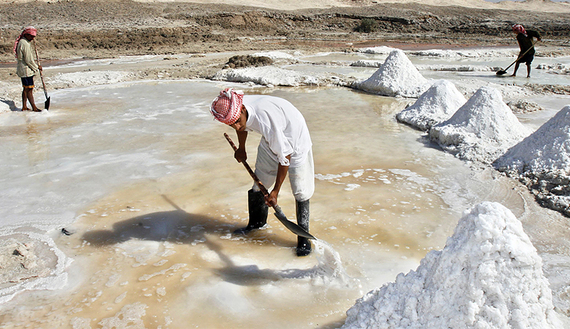BABIL, Iraq — Ali al-Jubouri, a farmer from the Babil countryside, patiently waits every year for the rainwater to evaporate from local natural salt lakes. He and his family then collect the salt left behind to sell to merchants. Ali is among a group of poor farmers forced by now-arid lands to find makeshift opportunities to earn income and provide for their families. Many residents have left for the cities, while those who remain have resorted to harvesting salt, which brings in little money.
Um Ali, Jubouri’s wife, along with five other female family members including her daughters, wade into the stagnant water at dawn to begin collecting salt. By noon, they manage to fill nearly seven bags, which they will sell for $1 a piece. When the work is done, Jubouri drives his old truck to the site to pick up the day’s collection.
Harvesting salt is seasonal work. The family waits through the scarce rains of winter in Babil’s al-Mahawil district, and then they wait some more, as the water evaporates from ponds and lakes in summer. As Jubouri told Al-Monitor, “The high temperatures [of summer], reaching 50 degrees Celsius [122 degrees Fahrenheit], cause the water to evaporate rapidly in the lakes, leaving the salt behind to be easily harvested.” The family works for a few weeks each year collecting salt.
In Iraq, one finds salt ponds on the outskirts of cities, in rural areas and along the border of desert lands. In these areas, residents and Bedouin work in the salt water that remains after most of it has evaporated.
In Kish, south of Babil, the Abu Hussein family also harvests salt in addition to practicing agriculture, the family’s main source of income. There are salt lakes only a few kilometers from Abu Hussein’s residence, and he and his family head there with their bags in the evening before sunset. Al-Monitor accompanied them on one occasion.
Pointing toward the lake in front of us, Abu Hussein said, “Those salt piles are the product of the past few days of work. We left them for several days to dry in the sun and get rid of the remaining humidity. Then, we will put the salt in large boxes and leave it until the humidity is totally gone. Finally, we put the salt in bags and sell it to merchants.”
Abu Hussein’s heels are cracked and damaged from the salt. He asked, “Is there any Iraqi farmer whose hands and heels are not cracked due to the primitive methods used in agriculture or in the extraction of salt?” Salt harvesting is typically done by individuals and is not overseen by any professional or regulatory organization.
“This hard work barely pays off at this time of the year. It is restricted to hot, sunny periods. In summer, the income might increase to $150,” said Abu Hussein.
The rural exodus of youths seeking jobs in the cities is creating difficulties for the people reliant on salt harvesting and sales. Iraqis’ income from salt is already low, and that is now being threatened by salt imports from neighboring countries.
Still, Abu Issam, a Bedouin who arrived in al-Mahawil in 1970, recalls a time when the process was even harder. He told Al-Monitor, “We used to put the salt in bags on the backs of camels and walk the cities’ neighborhoods to sell it to the people.” When Abu Issam sold salt, it was through the barter system. He would provide salt in exchange for desserts, soap, kitchen utensils or other items.
Salt has long played a role in Mesopotamian civilizations. The Assyrians used it as a weapon against enemies, sprinkling it on the heads of residents in the cities they conquered as a symbol of the curse that had befallen them.
In “The Story of Civilization,” American author, philosopher and historian William James Durant wrote about Assyrian King Ashurbanipalon’s offensive against Elam. Ashurbanipalon is quoted as saying, “I devastated the provinces of Elam and on their lands I sowed salt.” The Babylonian epic of Atrahasis remarks on the prevalence of the color white in the fields of ancient Mesopotamia, referring to the presence of salt.
Issam Kazim, an Iraqi merchant who imports foodstuffs including salt from Iran, told Al-Monitor that “the salt industry is still primitive” despite the long history of salt in Mesopotamia. “The Iraqi market is full of imported salt from neighboring countries, which has had an effect on the Bedouin and farmers’ primitive extraction, as it has become limited due to the foreign competition. This has caused them to relinquish these jobs, which generate a small amount of money. The remuneration is not commensurate with the effort they are making.”
Hassan al-Kallabi is a social researcher and health worker at the Hamza al-Gharbi Hospital, which serves communities of farmers and Bedouins. Speaking to Al-Monitor about the health problems that salt collectors face, he said, “They suffer from cracked, dry skin and rheumatic disease because their feet remain in salt water for a long period of time.” Kallabi added, “They do not wear gloves or protect their feet to prevent injuries. The risk they are under is their own fault and stems from their lack of awareness regarding the health hazards of the job.”
Kallabi said salt lakes could be used to heal skin diseases, but he advocates the development of local salt production to meet Iraqis’ needs and use of local salt in the pharmaceutical and food industries, such as for antacids and medical salts and in the meat and dairy industries and tanneries.
Iraq annually imports salt worth $250 million, though it has one of the largest salt ponds in the world. It seems a viable idea to invest in the country’s salt industry to further the economy.
(*)Wassim Bassem is an Iraqi journalist who tracks social phenomena in investigations and reports for various media outlets, including Al-Esbuyia, Bab Nour and Elaph.
TranslatorJoelle El-Khoury
Source: Al-Monitor, Posted February 1, 2016
http://www.al-monitor.com/pulse/originals/2016/02/iraq-salt-extraction-jobs-health-risks.html
Salt industry evaporating in Iraq. By Wassim Bassem *








Comment here